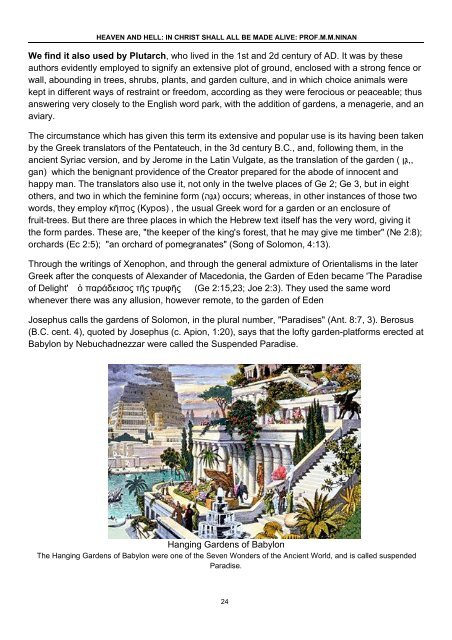Hell and Heaven
Create successful ePaper yourself
Turn your PDF publications into a flip-book with our unique Google optimized e-Paper software.
HEAVEN AND HELL: IN CHRIST SHALL ALL BE MADE ALIVE: PROF.M.M.NINAN<br />
We find it also used by Plutarch, who lived in the 1st <strong>and</strong> 2d century of AD. It was by these<br />
authors evidently employed to signify an extensive plot of ground, enclosed with a strong fence or<br />
wall, abounding in trees, shrubs, plants, <strong>and</strong> garden culture, <strong>and</strong> in which choice animals were<br />
kept in different ways of restraint or freedom, according as they were ferocious or peaceable; thus<br />
answering very closely to the English word park, with the addition of gardens, a menagerie, <strong>and</strong> an<br />
aviary.<br />
The circumstance which has given this term its extensive <strong>and</strong> popular use is its having been taken<br />
by the Greek translators of the Pentateuch, in the 3d century B.C., <strong>and</strong>, following them, in the<br />
,,גָּן ( garden ancient Syriac version, <strong>and</strong> by Jerome in the Latin Vulgate, as the translation of the<br />
gan) which the benignant providence of the Creator prepared for the abode of innocent <strong>and</strong><br />
happy man. The translators also use it, not only in the twelve places of Ge 2; Ge 3, but in eight<br />
others, <strong>and</strong> two in which the feminine form (גִּנָּה) occurs; whereas, in other instances of those two<br />
words, they employ κῆπος (Kypos) , the usual Greek word for a garden or an enclosure of<br />
fruit-trees. But there are three places in which the Hebrew text itself has the very word, giving it<br />
the form pardes. These are, "the keeper of the king's forest, that he may give me timber" (Ne 2:8);<br />
orchards (Ec 2:5); "an orchard of pomegranates" (Song of Solomon, 4:13).<br />
Through the writings of Xenophon, <strong>and</strong> through the general admixture of Orientalisms in the later<br />
Greek after the conquests of Alex<strong>and</strong>er of Macedonia, the Garden of Eden became 'The Paradise<br />
of Delight' ὁ παράδεισος τῆς τρυφῆς (Ge 2:15,23; Joe 2:3). They used the same word<br />
whenever there was any allusion, however remote, to the garden of Eden<br />
Josephus calls the gardens of Solomon, in the plural number, "Paradises" (Ant. 8:7, 3). Berosus<br />
(B.C. cent. 4), quoted by Josephus (c. Apion, 1:20), says that the lofty garden-platforms erected at<br />
Babylon by Nebuchadnezzar were called the Suspended Paradise.<br />
Hanging Gardens of Babylon<br />
The Hanging Gardens of Babylon were one of the Seven Wonders of the Ancient World, <strong>and</strong> is called suspended<br />
Paradise.<br />
24

















